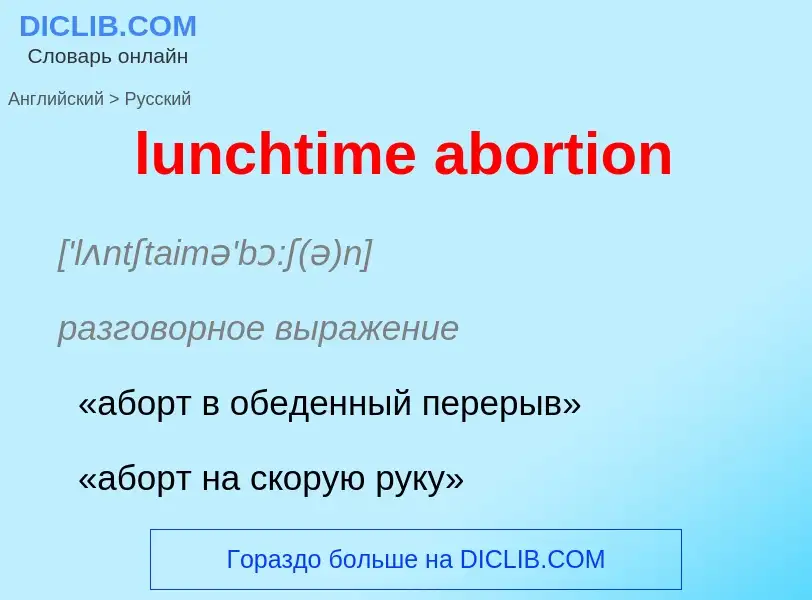Traduction et analyse de mots par intelligence artificielle ChatGPT
Sur cette page, vous pouvez obtenir une analyse détaillée d'un mot ou d'une phrase, réalisée à l'aide de la meilleure technologie d'intelligence artificielle à ce jour:
- comment le mot est utilisé
- fréquence d'utilisation
- il est utilisé plus souvent dans le discours oral ou écrit
- options de traduction de mots
- exemples d'utilisation (plusieurs phrases avec traduction)
- étymologie
lunchtime abortion - traduction vers russe
['lʌntʃtaimə'bɔ:ʃ(ə)n]
разговорное выражение
«аборт в обеденный перерыв»
«аборт на скорую руку»
мини-аборт (с помощью вакуум-экстрактора)
Définition
Wikipédia
Abortion laws vary widely among countries and territories, and have changed over time. Such laws range from abortion being freely available on request, to regulation or restrictions of various kinds, to outright prohibition in all circumstances. Many countries and territories that allow abortion have gestational limits for the procedure depending on the reason; with the majority being up to 12 weeks for abortion on request, up to 24 weeks for rape, incest, or socioeconomic reasons, and more for fetal impairment or risk to the woman's health or life. As of 2022, countries that legally allow abortion on request or for socioeconomic reasons comprise about 60% of the world's population.
Abortion continues to be a controversial subject in many societies on religious, moral, ethical, practical, and political grounds. Though it has been banned and otherwise limited by law in many jurisdictions, abortions continue to be common in many areas, even where they are illegal. According to a 2007 study conducted by the Guttmacher Institute and the World Health Organization, abortion rates are similar in countries where the procedure is legal and in countries where it is not, due to unavailability of modern contraceptives in areas where abortion is illegal. Also according to the study, the number of abortions worldwide is declining due to increased access to contraception.

![Paraná, Argentina]]. Argentina had restrictive laws until 2021. Paraná, Argentina]]. Argentina had restrictive laws until 2021.](https://commons.wikimedia.org/wiki/Special:FilePath/Vigilia por la votación de la Ley de Interrupción Voluntaria del Embarazo en Paraná 24.jpg?width=200)
![The [[October 2020 Polish protests]] were caused by severe changes to abortion laws. The [[October 2020 Polish protests]] were caused by severe changes to abortion laws.](https://commons.wikimedia.org/wiki/Special:FilePath/02020 0557 (2) Protest against abortion restriction in Kraków, October 2020.jpg?width=200)
![AGI]] [[meta-study]] on the reasons women stated for having an abortion AGI]] [[meta-study]] on the reasons women stated for having an abortion](https://commons.wikimedia.org/wiki/Special:FilePath/AGIAbortionReasonsBarChart.png?width=200)



